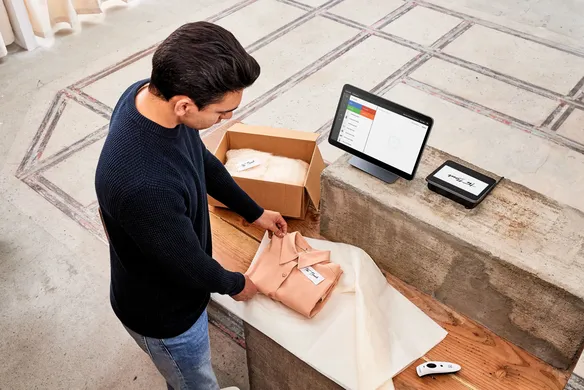Recently businesses all over the world were affected by the COVID-19 shock to supply chains. The retail supply chain has shifted from physical stores to online channels as non-essential businesses have closed and Australians self-isolate under lockdown orders. To prepare for long periods at home, consumers have stocked up on products such as medicine, cleaning supplies, toilet paper, and grocery staples.
A buying frenzy on some items and a drop in demand for others have caused supply chain disruptions for retail businesses. According to a Gartner report, a shift in consumer buying habits and temporary store closures in some markets have some nonessential retailers (luxury goods and apparel, for instance) rethinking business operations.
“The global outbreak of COVID-19 is creating a very dynamic environment in retail supply chains,” says Thomas O’Connor, senior director analyst with the Gartner Supply Chain practice. “Demand is shifting from physical stores to online channels as consumers seek to avoid public places due to fear of infection or government restrictions.”
What is a global supply chain?
The definition of a global supply chain is pretty straightforward — it is an international system that businesses use to produce products and/or services. But if this actual process sounds complex, well, that is because it is. With so many moving parts, supply chain efficiency has to be like clockwork. Any supply chain disruption can have ripple effects all the way down the line to the smallest of businesses. So, when the pandemic occurred, it created issues with almost every supply chain, especially restaurant and retail supply chains.
Keeping supply chains open
Essential businesses — such as grocery, convenience, and hardware stores — and shops that have made the shift to eCommerce should focus on maintaining close communication with existing suppliers while also developing backup alternatives to maintain their online retail supply chain.
Companies that rely on the flow of supplies or finished goods from overseas need to be prepared for sudden interruptions in the global supply chain. Being so dependent on international shipping, the Australian supply chain was severely disrupted and many businesses are still feeling the effects on the retail supply chain.
The Gartner analysts recommend that retailers prioritise operations to meet consumer demand. That means closely monitoring fluctuations in demand and working with suppliers to ensure the availability of inventory. To prepare for potential broken supply chains, retailers also need to have alternative supply sources and temporary distribution facilities that can support product replenishment as needed.
Managing suppliers
In their research report “Coronavirus Alters Supply Chain Dynamics Impacting People, Products and Costs,” Gartner analysts warn that companies must adjust their retail supply chain and strategies. “Adapt and adjust global demand and supply plans and manage customer expectations regarding product access,” advises the report.
For essential businesses, the challenge in retail supply chain management is often to maintain existing relationships, develop backup suppliers, prepare for disruptions, closely monitor existing contracts and orders, and have alternative transportation and delivery options available.
For nonessential businesses that have closed their brick-and-mortar locations but are still providing online sales, it’s important to deliver reliable and positive customer experiences, implement frictionless transaction capabilities, and work with multiple shippers for timely fulfillment and to mitigate any supply chain disruption.
As the pandemic evolves, supply chain managers should consider proactively tracking additional costs resulting from their crisis management and business continuity activities. Moreover, the Gartner analysts recommend that, as a business owner, you should be updating your business plan in response to this new operating and retail supply chain environment.
Planning for the future
Retailers need to prepare for an eventual return to normal operations and, at the same time, anticipate a realignment of consumer behaviour towards online shopping.
Rethink the retail supply chain
Many companies also may need to rethink their retail supply chain management. “A decades-long focus on supply chain optimisation to minimise costs, reduce inventories, and drive up asset utilisation has removed buffers and flexibility to absorb disruptions,” notes a Deloitte report. “COVID-19 illustrates that many companies are not fully aware of the vulnerability of their supply chain relationships to global shock.”
Brace for uncertainty
Retailers also need to brace for market volatility and a potential “bullwhip” effect in which inventory fluctuates unpredictably in response to changing consumer demand. In this precarious pandemic ecosystem, it’s important to closely monitor at-risk suppliers and have contingency plans for growing your retail supply chain and sourcing from more than one partner.
Be flexible
Ultimately, retailers need to carefully monitor supply and demand data, work closely with their suppliers, and creatively manage their workforce. “Employees who aren’t needed in shops at the moment can, for example, deliver products to online shoppers or work from home in customer support,” says Gartner’s O’Connor.
Look to the future
Retail supply chains will probably face additional disruptions. When? Well, no one can predict the future, but you can try to plan for it. Retailers also need to look for opportunities to better position themselves for the future. “For many companies, the next six months will have only one goal: survival,” says Nicola Longfeld, global consumer and retail lead for KPMG. “For others, there may be an opportunity to focus on how to emerge from the crisis a stronger, better positioned, more valuable business. Whatever your objective, we believe it is essential to take steps to position your business for the post COVID-19 world, while taking care of your employees, as well as your broader stakeholders.”
Whether you are looking to start an eCommerce business with a Square Online Store, or wondering how you can motivate your employees during the coronavirus crisis, we are here to help you and your business keep going.
![]()











